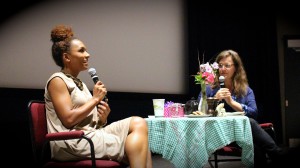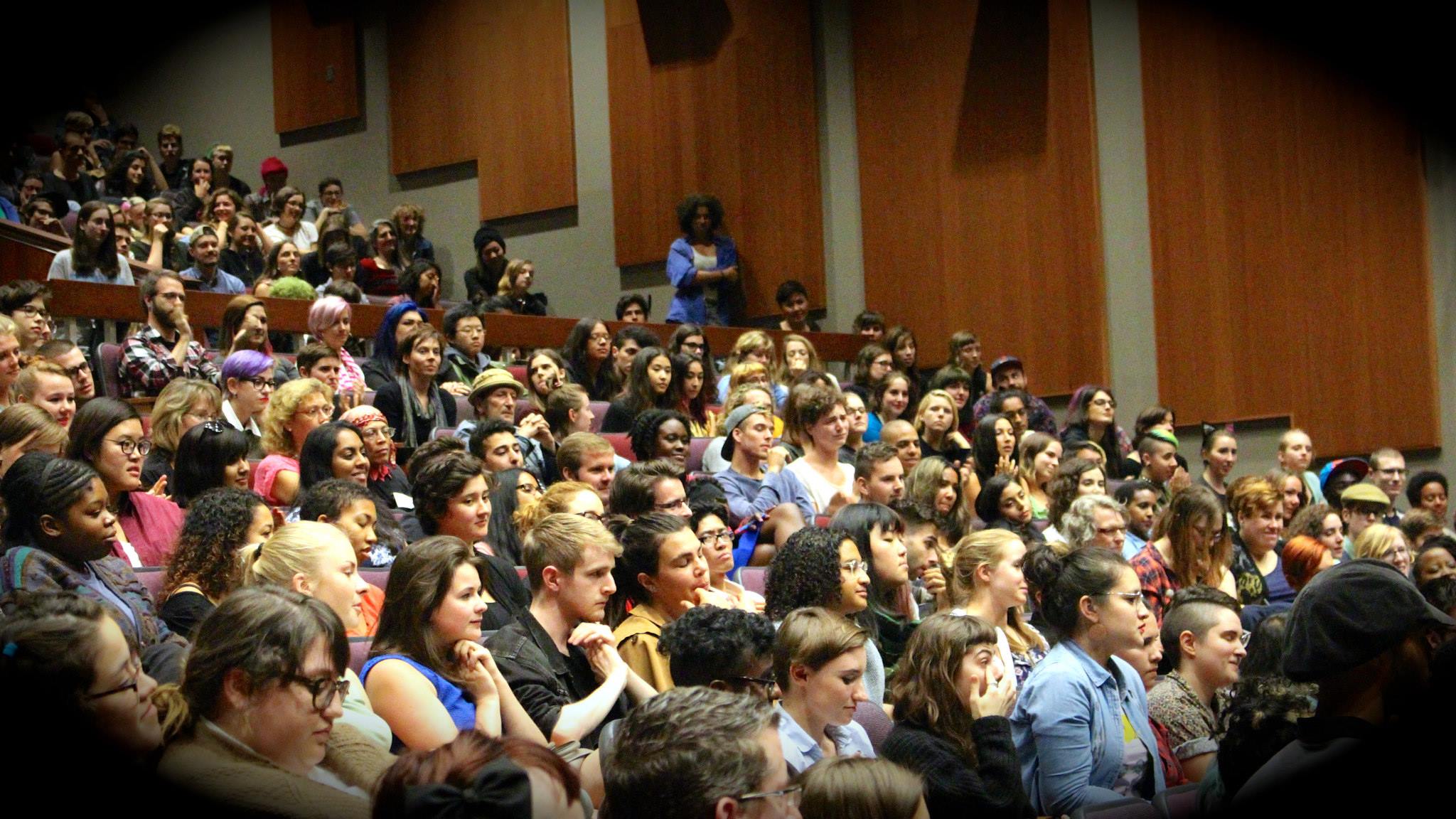The Porn Event discusses real vs commercialized sex
by Sara Baron-Goodman
Last Monday, Concordia welcomed guest speakers Sarah Beall and Ignacio Rivera (AKA Papi Coxxx), to the much-anticipated Porn Event as part of the Another Word for Gender series.
The talk covered just about everything from prostate massages, to fetish parties, to working in the sex industry in general.
Beall is the curator of content for MakeLoveNotPorn.tv, a new generation porn site that focuses on real sex and user-generated content to show the world that porn isn’t all bad pink-tinted fluorescent lighting and women getting cum facials. As Beall said, in real life, if you want to come on a woman’s face, you damn well better ask first.

“We want to see everything… that part where you elbow your partner in the chin while reaching for the lube, we want to keep that in,” said Beall of the kind of content she looks for in selecting videos for the site.
MakeLoveNotPorn aims to de-fetishize certain minority groups, and represent an all-encompassing picture of real-life sex between real-life people. It puts a strong emphasis on showing safe, consensual sex.
“When I think about feminist porn, it’s about fair pay, safe environment, there’s a transparency,” said Rivera. “There’s fantasy there but there’s a backdrop to it. We get to see bodies we don’t see in mainstream porn, outside of fetish markets.”
Rivera is an activist, filmmaker, sex educator, performance artist, sex worker, and a trans gender-queer, self-proclaimed lover of kink, who seems to have done and seen it all.
For them both, the key to a more empowered future of porn is breaking down the sterilized picture, and showing the nitty-gritty reality of sex, with a strong emphasis on consent and setting visible boundaries between both partners.
“In the real world we know you have prep your ass to get rammed,” said Rivera. “In porn, you don’t see that somebody had to wear a butt plug for three hours first.”
The most important takeaway is that real life sex and the kind of sex usually shown in traditional porn, are two very different things. A lack of formal sex education in schools has made it so that many young people are getting the bulk of their formative knowledge about sex from porn—and it’s a flawed image to be sure. This is why the movement towards indie porn and feminist porn is so important.
Exploring Another Word for Gender, Janet Mock talks trans rights and feminist freedom
by Guenevere Neufeld
Janet Mock, prominent TV host, speaker and advocate for trans and women’s rights, spoke about her life as a trans woman for the keynote address of the Another Word for Gender Series last Friday.
Mock was first brought into the limelight as a trans woman in a 2011 Marie Claire article. Despite the many problems Mock has with the article, the attention drawn to her by it gave Mock the platform to speak up on behalf of trans women and women of colour.
Over 600 audience members filled the Hall building’s H-110 auditorium beyond capacity to hear about Mock’s philosophy on feminism and gender issues. Paying homage to mentors and colleagues such as Audre Lorde, bell hooks, and Laverne Cox, Mock described her mission to defend the image of trans women of colour and dissect cultural stigmas surrounding these people.
“Writing is a source to freedom,” she said, highlighting the importance of telling stories and listening to the stories of others. She says her activism “started at the kitchen table,” referencing Barbara Smith’s feminist essay Kitchen Table: Women of Color Press.
Mock acknowledges she has been granted “conditional privilege.” She is given access to platforms to spread her message because she makes certain choices to fit into society. Yet rather than uphold power structures as they are, Mock also wants to “go into these spaces like a Trojan horse and blow stuff up” in order to “push that space.”
“I’m a big proponent of creating your own space,” she said. “For me I’m a big proponent of knowing that there’s other people who feel as alienated as me, and I’d rather organize with them, become more powerful with them in the community, and then go into those spaces as a group.”
She spoke of creating clear definitions of “community” and “allies” and how important it is, especially for young trans people, to have a strong support network.
The evening ended with a book signing of her 2014 memoir Redefining Realness, in which she tells her own story.
“It’s all about language,” she says. “I should be as authentic as I feel I’m safe enough to be.”
Reproductive Justice has no borders
by Olivia Ranger-Enns
Reproductive justice. People will either be nodding or scratching their heads at these two simple words. What exactly is reproductive justice? According to The Pro-Choice Public Education Project, reproductive justice is “the complete physical, mental, spiritual, political, social, and economic well-being of women and girls, based on the full achievement and protection of women’s human rights.”
A panel held at Concordia University on Oct. 2 shed some light on this complicated, multi-faceted issue.
Jessica Danforth, executive director of the Native Youth Sexual Health Network, opened the floor. She spun forth an exhaustive link between race and gender issues. “We speak in terms of bodies and spaces,” said Danforth. “Aboriginal women have been colonized both in terms of their culture and in terms of their bodies. We don’t ask about the assault, we ask the more important question: why does it happen?”
Danforth went on to share some background on reproductive justice. The term was coined back in 1994 when black women wanted to shift away from pro-choice advances. “We are constantly laid back by barriers such as poverty, discrimination, immigration status and incarceration,” said Danforth.
The issue of reproductive justice got up close and personal when an Aboriginal woman came to the mic to talk about living on the Kahnawake reserve.
“There are so many issues with reproductive justice when it comes to Aboriginals,” she said. “I live on this reserve, and it’s not even possible to give birth here. On top of it, there are so many teen pregnancies. I have taught a 13-year-old girl theatre, only to learn that she herself was already pregnant. The stigma of getting pregnant doesn’t make any sense. It even happened to my little sister!”
Danforth stressed the fact that her story was not one of apathy but of action. “This is not a sob-story, a story asking people to feel sorry for Aboriginal women, or women in general,” said Danforth. “We were colonized and manipulated, and that’s the story. We knew about sex beforehand. After all, we didn’t wait for Christopher Columbus to teach us about sex,” she said, as the audience chuckled.
Danforth went on to make another connection between gender and environmental issues. “We all know that the Canadian government is ruining Aboriginal land through logging and mining. The contaminated water and mercury levels are corrupting breast milk, causing major diseases like ovarian cancer and neurological problems for young children,” said Danforth. “This has to stop.”
All in all, Danforth led a strong and well-balanced talk, weaving between theory and anecdotes, which provided some much-needed comic relief.
“We are constantly isolating, demonizing and shaming young women. That is not the issue,” said Danforth, stabbing the air with her finger. “The issue is how we are going to get over this problem.”




